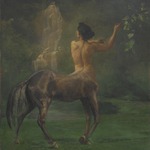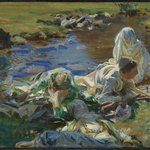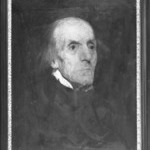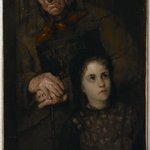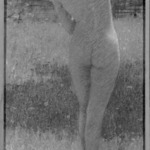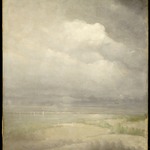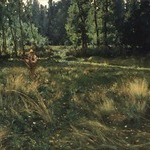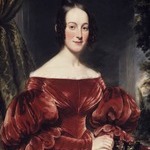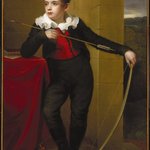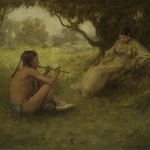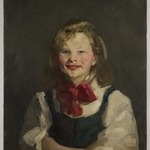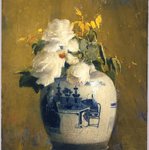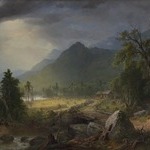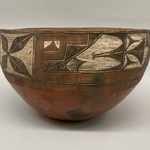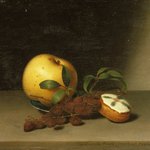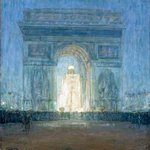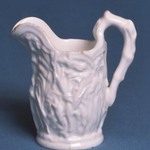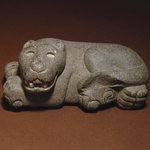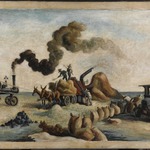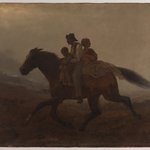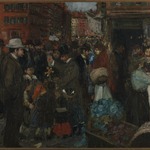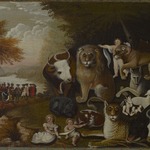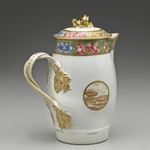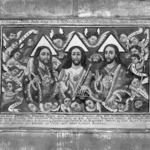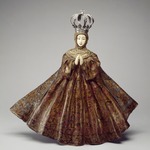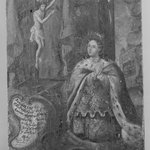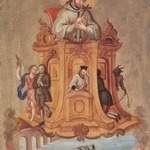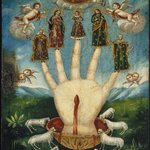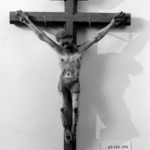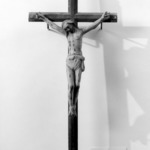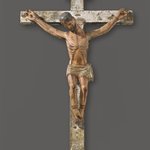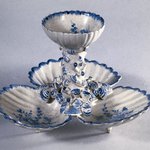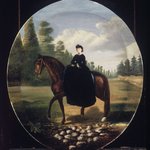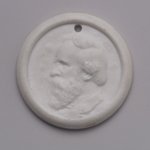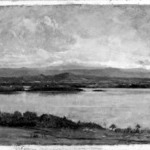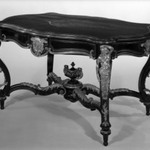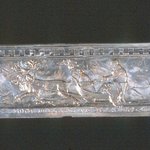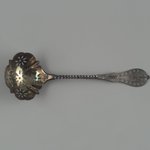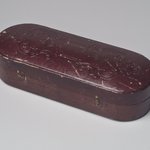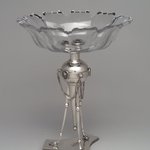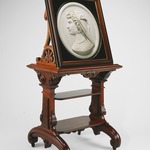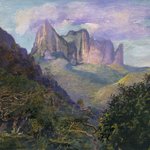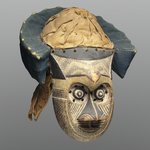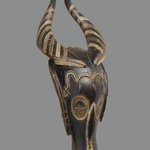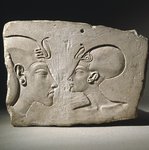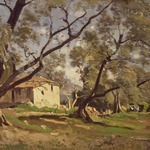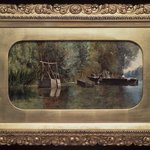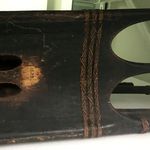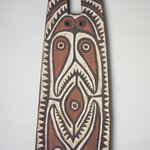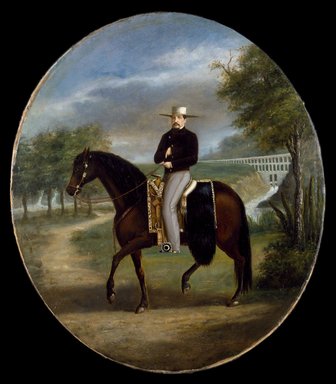
Don Manuel Romero de Terreros y Villar-Villamil
Attributed to follower of Édouard Pingret
European Art
On View: American Art Galleries, 5th Floor, Radical Care
In his full-length equestrian portrait, Don Manuel commemorated one of his greatest achievements, the completion of the aqueduct of Tepotzotlán (more commonly known as the Arcos de Sitio) outside Mexico City. Born into one of Mexico’s leading Creole families, he had renounced several ancestral titles and associated properties by the time he assumed the role of governor of the Federal District (Mexico City). In his short term, he promoted the establishment of charities, improved local hospitals, and reformed the jails.
When Napoleon III installed Archduke Ferdinand Maximilian as puppet emperor of Mexico in 1864, Don Manuel, a staunch Mexican patriot and liberal idealist, immigrated to France. He lived there through Maximilian’s fall in 1867 (his portrait and that of his daughter, illustrated below, were probably commissioned at that time), supporting Mexican liberals expelled by the short-lived European regime. After the defeat of the empire, he returned to Mexico, where he remained for the rest of his life.
En su retrato ecuestre de cuerpo entero, don Manuel conmemora uno de sus grandes logros, la culminación del acueducto de Tepotzotlán (más comúnmente conocido como Arcos de Sitio) en las afueras de la Ciudad de México. Nacido en el seno de una de las familias criollas más importantes de México, don Manuel había renunciado ya a numerosos títulos ancestrales y propiedades asociadas a ellos para cuando asumió el papel de Gobernador del Distrito Federal (Ciudad de México). En un corto periodo, promovió el establecimiento de obras de caridad, mejoró hospitales locales y reformó las cárceles.
Cuando Napoleón III instaló al Archiduque Ferdinando Maximiliano como emperador marioneta de México en 1864, don Manuel, leal patriota mexicano y liberal idealista, emigró a Francia. Vivió allí, apoyando a los liberales mexicanos expulsados por el efímero régimen europeo, hasta la caída de Maximiliano en 1867. Su retrato y el de su hija (ilustrado debajo) fueron probablemente encargados en esta época. Después de la caída del imperio, retornó a México, donde permaneció por el resto de su vida.
When Napoleon III installed Archduke Ferdinand Maximilian as puppet emperor of Mexico in 1864, Don Manuel, a staunch Mexican patriot and liberal idealist, immigrated to France. He lived there through Maximilian’s fall in 1867 (his portrait and that of his daughter, illustrated below, were probably commissioned at that time), supporting Mexican liberals expelled by the short-lived European regime. After the defeat of the empire, he returned to Mexico, where he remained for the rest of his life.
En su retrato ecuestre de cuerpo entero, don Manuel conmemora uno de sus grandes logros, la culminación del acueducto de Tepotzotlán (más comúnmente conocido como Arcos de Sitio) en las afueras de la Ciudad de México. Nacido en el seno de una de las familias criollas más importantes de México, don Manuel había renunciado ya a numerosos títulos ancestrales y propiedades asociadas a ellos para cuando asumió el papel de Gobernador del Distrito Federal (Ciudad de México). En un corto periodo, promovió el establecimiento de obras de caridad, mejoró hospitales locales y reformó las cárceles.
Cuando Napoleón III instaló al Archiduque Ferdinando Maximiliano como emperador marioneta de México en 1864, don Manuel, leal patriota mexicano y liberal idealista, emigró a Francia. Vivió allí, apoyando a los liberales mexicanos expulsados por el efímero régimen europeo, hasta la caída de Maximiliano en 1867. Su retrato y el de su hija (ilustrado debajo) fueron probablemente encargados en esta época. Después de la caída del imperio, retornó a México, donde permaneció por el resto de su vida.
MEDIUM
Oil on paper, mounted on canvas
DATES
ca. 1865
DIMENSIONS
oval: 26 1/4 x 22 7/8 in. (66.7 x 58.1 cm)
frame: 32 3/8 x 29 3/8 x 3 1/2 in. (82.2 x 74.6 x 8.9 cm) (show scale)



COLLECTIONS
European Art
ACCESSION NUMBER
52.166.15
CREDIT LINE
Museum Collection Fund and Dick S. Ramsay Fund
PROVENANCE
Ca. 1865, probably commissioned from the artist by Manuel Romero de Terreros y Villar-Villamil; 1878, probably inherited from Manuel Romero de Terreros y Villar-Villamil by Maria Josefa Romero de Terreros de Parada; 1932, probably inherited from Maria Josefa Romero de Terreros de Parada by Ángel Algara Romero de Terreros y de Cervantes of New York, NY; 1952, gift of Ángel Algara Romero de Terreros y de Cervantes to the Brooklyn Museum.
Provenance FAQ
CATALOGUE DESCRIPTION
This oval equestrian portrait in oils of Don Manuel shows him dressed in the national "Charro" costume on a horse facing to the left. The saddle and accessories are still used today with variations in Mexico. He has black hair and a large mustache. He holds the reins in his left hand while the right one is in his vest. In the landscape background is the monumental aqueduct "El Sitio" part of his hacienda "Xalpa" which was started by the Jesuit fathers in Colonial times and which Don Manuel completed in the middle of the 19th century. He renounced his titles of nobility because of his liberal ideas. He served as Senator of the Republic and Governor of the Federal District (Mexico City). He was very fond of horses and his serapes are at the Museum.
Condition: Good with some small cracks at the top.
EXHIBITIONS
MUSEUM LOCATION
This item is on view in American Art Galleries, 5th Floor, Radical Care
CAPTION
Attributed to follower of Édouard Pingret (French, 1788–1875). Don Manuel Romero de Terreros y Villar-Villamil, ca. 1865. Oil on paper, mounted on canvas, oval: 26 1/4 x 22 7/8 in. (66.7 x 58.1 cm). Brooklyn Museum, Museum Collection Fund and Dick S. Ramsay Fund, 52.166.15 (Photo: Brooklyn Museum, 52.166.15_SL3.jpg)
IMAGE
overall, 52.166.15_SL3.jpg. Brooklyn Museum photograph
"CUR" at the beginning of an image file name means that the image was created by a curatorial staff member. These study images may be digital point-and-shoot photographs, when we don\'t yet have high-quality studio photography, or they may be scans of older negatives, slides, or photographic prints, providing historical documentation of the object.
RIGHTS STATEMENT
No known copyright restrictions
This work may be in the public domain in the United States. Works created by United States and non-United States nationals published prior to 1923 are in the public domain, subject to the terms of any applicable treaty or agreement.
You may download and use Brooklyn Museum images of this work. Please include caption information from this page and credit the Brooklyn Museum. If you need a high resolution file, please fill out our online application form (charges apply).
The Museum does not warrant that the use of this work will not infringe on the rights of third parties, such as artists or artists' heirs holding the rights to the work. It is your responsibility to determine and satisfy copyright or other use restrictions before copying, transmitting, or making other use of protected items beyond that allowed by "fair use," as such term is understood under the United States Copyright Act.
The Brooklyn Museum makes no representations or warranties with respect to the application or terms of any international agreement governing copyright protection in the United States for works created by foreign nationals.
For further information about copyright, we recommend resources at the United States Library of Congress, Cornell University, Copyright and Cultural Institutions: Guidelines for U.S. Libraries, Archives, and Museums, and Copyright Watch.
For more information about the Museum's rights project, including how rights types are assigned, please see our blog posts on copyright.
If you have any information regarding this work and rights to it, please contact copyright@brooklynmuseum.org.
RECORD COMPLETENESS
Not every record you will find here is complete. More information is available for some works than for others, and some entries have been updated more recently. Records are frequently reviewed and revised, and we welcome any additional information you might have.
